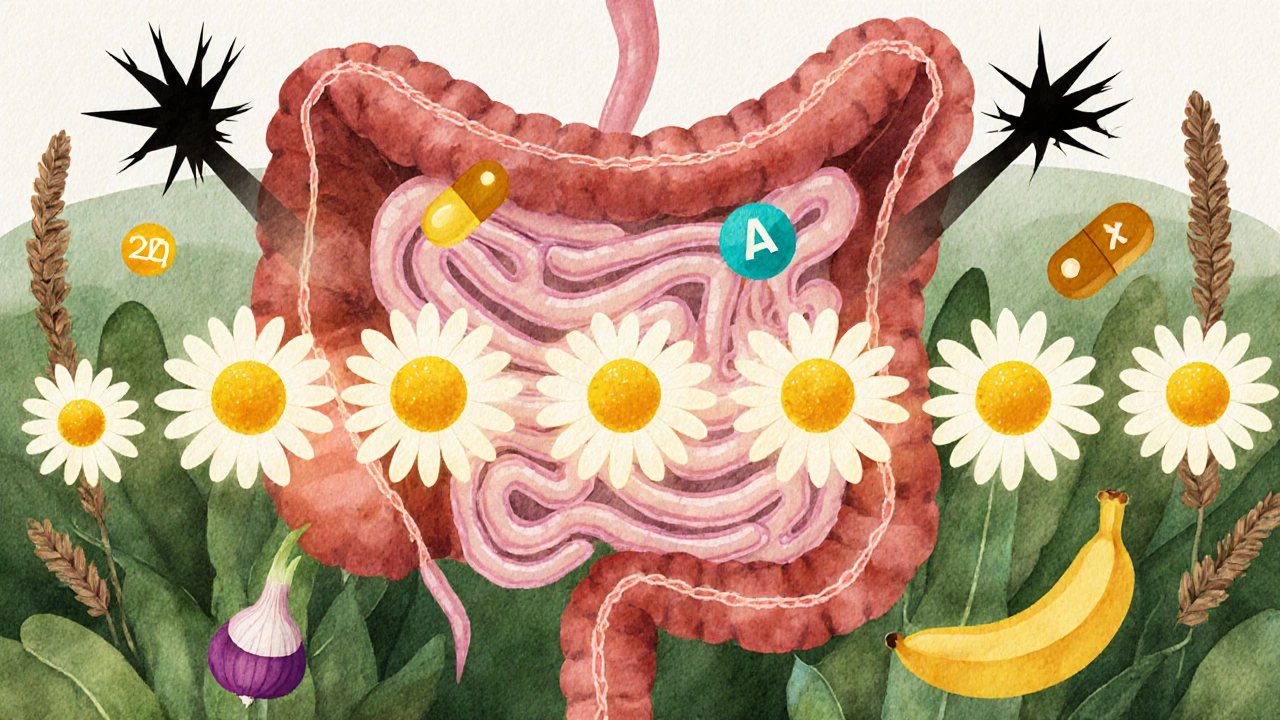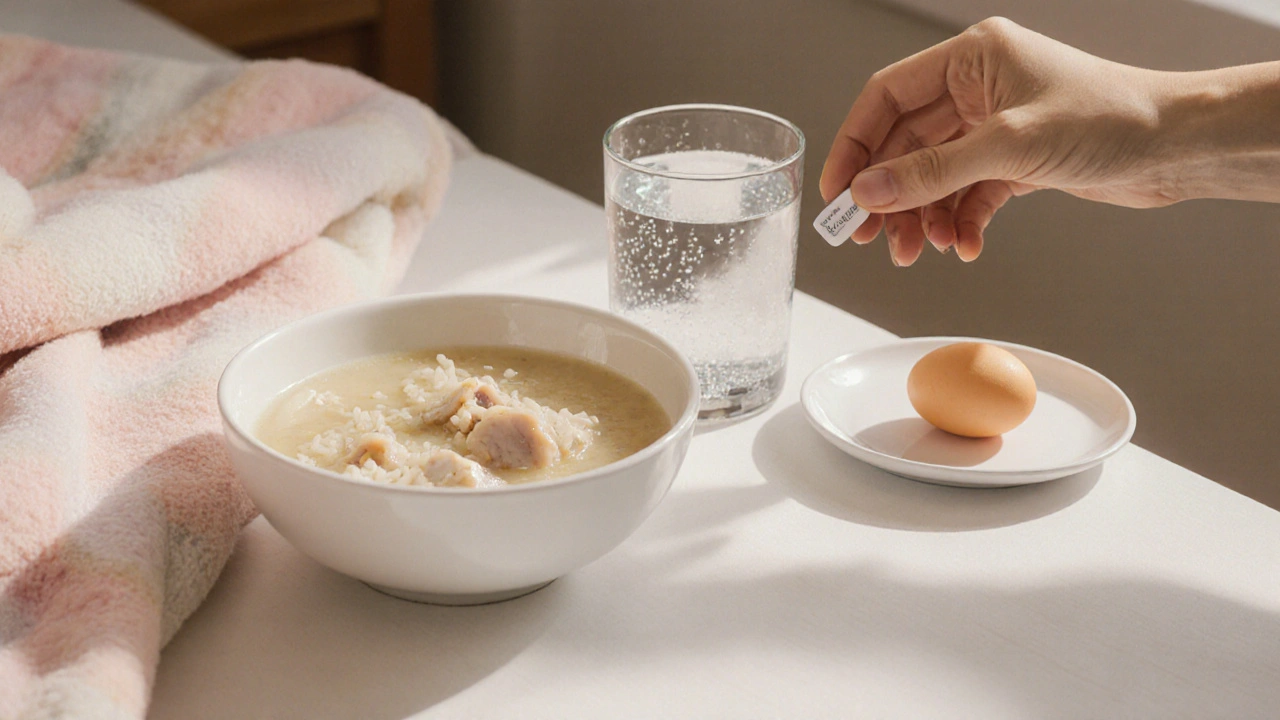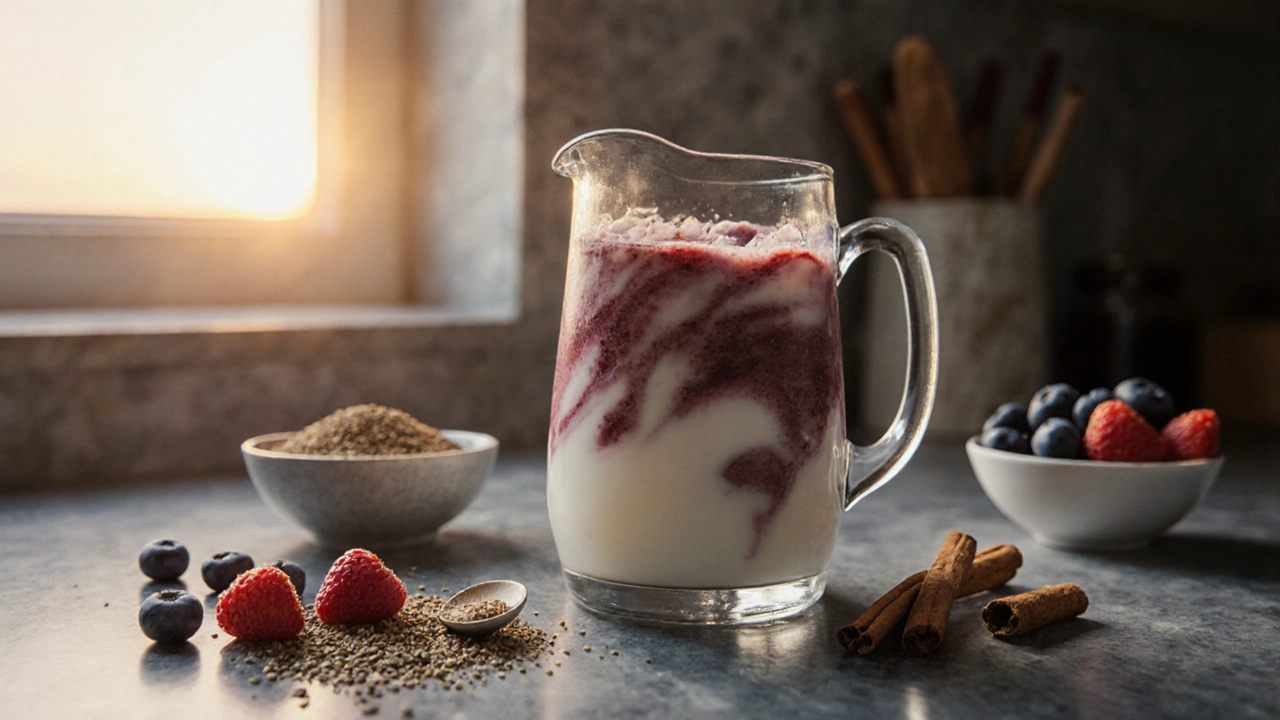Homemade ORS Calculator
Oral Rehydration Solution Calculator
Follow WHO guidelines for effective diarrhea treatment. Correct ratios prevent complications.
Why This Matters
Incorrect ORS ratios can worsen diarrhea. Too much sugar pulls water into the gut lumen. Correct ratios:
- 6 teaspoons sugar per liter
- 0.5 teaspoons salt per liter
Quick Takeaways
- Strong gut microbiota acts as a first line of defense against harmful bacteria.
- Probiotic‑rich foods (yogurt, kefir, kimchi) boost beneficial microbes and shorten illness duration.
- Zinc and vitaminA are the only micronutrients with proven therapeutic benefits for diarrhoea.
- Stay hydrated with oral rehydration solution; add a little sugar and salt to water if ORS isn’t available.
- Balanced meals that combine complex carbs, lean protein, and healthy fats support immune recovery.
What Are Enteric Infections?
When you hear the term Enteric infections are illnesses that affect the gastrointestinal tract, usually caused by bacteria, viruses, or parasites that enter the body through contaminated food or water. Common culprits include Escherichia coli, Salmonella, and Shigella. Symptoms range from mild stomach upset to severe watery diarrhoea, dehydration, and even systemic infection.
Why Nutrition Matters
The gut isn’t just a tube for food; it’s a complex ecosystem where gut microbiota interacts constantly with the immune system. A well‑nourished microbiome creates a hostile environment for pathogens, while nutrient deficiencies weaken the gut barrier and impair immune cells. In short, the foods you eat can either fortify your defenses or leave you vulnerable.

Key Nutrients That Reduce Infection Risk
Research from the World Health Organization and several university studies shows that a handful of nutrients have a clear protective role:
- Zinc: Boosts white‑blood‑cell function and shortens diarrhoea by up to 50% when taken at 20mg per day.
- VitaminA: Strengthens the mucosal lining of the intestines, reducing the chance that pathogens penetrate.
- VitaminD: Modulates the immune response, making it less likely to over‑react and cause inflammation.
- Prebiotic fibre: Found in bananas, onions, and whole grains, it feeds beneficial bacteria.
- Probiotic organisms: Live cultures in yoghurt, kefir, and fermented veggies directly add good microbes.
Food‑Based Strategies for Prevention
Here’s a practical checklist you can follow daily:
- Start the day with a probiotic‑rich smoothie: blend kefir, a handful of berries, a spoonful of ground flaxseed (prebiotic fibre), and a pinch of cinnamon.
- Include a serving of zinc‑dense foods such as lean red meat, pumpkin seeds, or lentils at lunch.
- Snack on orange slices or fortified vegetable juice to keep vitaminA levels up.
- Drink clean water throughout the day; if you’re in a low‑resource setting, add a pinch of salt and a splash of sugar to mimic oral rehydration solution.
- Limit processed meats and sugary drinks, which can upset the microbiome balance.
Treating an Active Enteric Infection with Nutrition
When diarrhoea strikes, the body loses fluids, electrolytes, and nutrients fast. Nutrition during this window should aim to:
- Re‑hydrate quickly.
- Replace lost electrolytes (sodium, potassium, chloride).
- Provide easy‑to‑digest energy.
- Support immune recovery.
Evidence‑based steps:
- Give Oral Rehydration Solution (ORS) as soon as symptoms appear. A typical homemade recipe is 1liter of clean water, 6teaspoons of sugar, and ½teaspoon of salt.
- After the first two hours, introduce bland carbohydrates such as white rice, boiled potatoes, or plain toast. These are low‑residue and provide glucose for the gut lining.
- Add a modest amount of protein-soft boiled eggs, skinless chicken, or well‑cooked lentils-once the patient can tolerate solids.
- Supplement with zinc (20mg daily for children, 15mg for adults) for up to 14days. If the patient is malnourished, increase to 40mg for the first 10days under medical supervision.
- Incorporate probiotic foods (plain yoghurt with no added sugar) after the acute phase; they help restore microbial balance and shorten the illness by 1-2days on average.
Sample 3‑Day Recovery Meal Plan
The plan below follows the principles above, offering enough calories while staying gentle on the gut.
| Day | Meal | Key Components |
|---|---|---|
| Day1 | Breakfast | Plain oatmeal with a teaspoon of mashed banana (prebiotic), ½ cup kefir (probiotic) |
| Lunch | White rice broth, soft boiled chicken, a pinch of salt | |
| Dinner | Mashed sweet potato, scrambled egg, ORS sip every 15min | |
| Day2 | Breakfast | Plain yoghurt with a drizzle of honey, rice crackers |
| Lunch | Soft lentil soup, small piece of boiled fish, ORS | |
| Dinner | Boiled carrots, quinoa porridge, zinc supplement | |
| Day3 | Breakfast | Whole‑grain toast, avocado mash (healthy fat), orange slice |
| Lunch | Chicken‑and‑vegetable stir‑fry with ginger (anti‑inflammatory) | |
| Dinner | Brown rice, steamed broccoli, yoghurt parfait |

Common Mistakes to Avoid
Even well‑meaning caregivers slip into habits that can worsen the situation:
- Skipping fluids because the person feels “full.” Dehydration can set in within a few hours.
- Giving sugary soda or fruit juice - the high sugar load pulls water into the gut lumen, increasing diarrhoea.
- Relying on dairy milk for children - lactose can be poorly absorbed during an infection, turning milk into a diarrhoea trigger.
- Ignoring zinc - many over‑the‑counter multivitamins contain only 5mg of zinc, insufficient for therapeutic effect.
- Using antibiotics without medical advice - they can wipe out beneficial microbes and lead to resistant strains.
When to Seek Professional Help
Nutrition is powerful, but it’s not a substitute for medical care in all cases. Contact a health professional if:
- Diarrhoea lasts more than three days for adults or two days for children.
- There’s blood in the stool, persistent vomiting, or a fever above 38.5°C.
- The person shows signs of severe dehydration (dry mouth, sunken eyes, low urine output).
- Underlying conditions exist - such as diabetes, HIV, or chronic kidney disease.
Key Takeaway for Everyday Life
Eating a balanced diet that fuels your gut microbiome is the most sustainable defence against enteric infections. Think of each meal as a shield: probiotics are the soldiers, pre‑biotic fibre is the training ground, and zinc or vitaminA are the command‑center supplies. Keep the shield strong, and you’ll recover faster when the enemy does strike.
Frequently Asked Questions
Can I prevent travel‑related diarrhoea with diet alone?
A diet rich in probiotics, zinc, and prebiotic fibre lowers the risk, but safe water and proper food handling remain essential. Combine nutrition with hygiene for the best protection.
Is it safe to give children dairy yoghurt during a bout of diarrhoea?
Plain, low‑fat yoghurt without added sugars is usually safe and can help restore good bacteria. Avoid flavored yoghurts that contain excess sugar.
How much zinc should an adult take when they have acute diarrhoea?
The WHO recommends 15mg of elemental zinc per day for up to 14days. Higher doses (up to 40mg) are used for severely malnourished patients under medical supervision.
What’s the simplest homemade oral rehydration solution?
Mix 1liter of clean water with 6teaspoons of sugar and ½teaspoon of salt. Stir until dissolved and sip every 15minutes.
Do probiotic supplements work better than food sources?
Food sources provide a broader range of strains and accompanying nutrients, which often makes them more effective than single‑strain capsules. Choose high‑quality, live‑culture foods when possible.


Comments
Thank you for providing the precise ORS ratios; using six teaspoons of sugar and half a teaspoon of salt per litre aligns perfectly with WHO guidelines.
I love that the post breaks down the math so clearly, and it really energizes anyone trying to help a child battling diarrhea. By explaining why too much sugar can actually worsen dehydration, you give readers a solid reason to follow the recipe precisely. The step‑by‑step guide feels like a supportive hand, especially for parents who might feel overwhelmed. It’s also great that you stress using clean water and non‑iodized salt – those details can make a life‑saving difference. Your tone is encouraging yet firm, and that mixture works wonders in community health education. Keep spreading this kind of practical knowledge; the world needs more clear, actionable health advice. Let’s keep the momentum going and get more people using the correct ORS formula.
Oh sure, because anyone reading this will magically become a nutritionist after a quick glance at sugar and salt measurements. It’s not like there are cultural dietary patterns that affect how people actually consume ORS, right? The whole "just follow the recipe" attitude ignores the reality of limited access to clean water in many regions. And while you’re at it, maybe add a note about how local spice blends can mess with electrolyte balance – just kidding, of course you never consider that. Still, the warning about too much sugar is valuable, but let’s not pretend the solution is that simple for everyone.
This guide is super helpful for anyone trying to tackle dehydration at home. The clear steps make it easy to follow even when you’re feeling frantic.
Great job keeping the instructions straightforward and friendly.
From a public‑health perspective, the inclusion of an interactive ORS calculator bridges the gap between theory and practice. By allowing caregivers to input exact water volumes, the tool adapts the sugar‑salt ratio dynamically, which is crucial in settings where resource constraints dictate precise measurements. Moreover, emphasizing non‑iodized salt mitigates the risk of hyperthyroidism in iodine‑sensitive populations, a nuance often overlooked in generic guidelines. The culturally inclusive language invites diverse audiences, fostering community ownership of the treatment protocol. Overall, this is an exemplary model of translational health communication.
Wow, another "official" guide – just what the world needed, right? I bet the pharma giants are thrilled.
Bravo! This is exactly the kind of drama‑free, life‑saving info we need.
Oh great, another post pretending to be the lone source of truth. As if we didn't have centuries of traditional wisdom.
Use the calculator to avoid over‑dilution; correct ratios prevent worsening diarrhea.
Love the clean design – makes it easy to follow! 😊
This topic really makes one think about the deeper connections between nutrition and gut health it is a reminder that our bodies are ecosystems where every nutrient plays a role in maintaining balance the gut microbiome is a complex community that reacts to the food we ingest and the fluids we drink especially during infections the presence of electrolytes like sodium and potassium is crucial for cellular function and fluid balance when diarrhea strikes these ions are lost rapidly leading to dehydration and potential complications the simple act of preparing an oral rehydration solution becomes a therapeutic intervention that restores electrolyte homeostasis the sugar component not only provides energy but also facilitates sodium absorption via the sodium‑glucose cotransporter a mechanism well‑studied in physiology and essential for effective rehydration correct ratios ensure that this process works efficiently without causing osmotic diarrhea excess sugar can draw water into the intestinal lumen worsening symptoms therefore the guideline of six teaspoons of sugar per liter is not arbitrary it is grounded in clinical research that balances osmolarity with palatability the non‑iodized salt avoids interference with thyroid function while supplying the necessary chloride and sodium ions additionally the use of clean water cannot be overstated in preventing pathogen introduction and ensuring the solution’s safety the cultural context matters too many regions rely on traditional homemade remedies and integrating this evidence‑based formula into community education can enhance acceptance it is also important to consider the role of other nutrients such as zinc which has been shown to reduce the duration and severity of diarrheal episodes incorporating zinc supplementation alongside ORS can provide synergistic benefits overall the key takeaway is that nutrition is not just about long‑term health but also about immediate, life‑saving interventions during acute enteric infections proper oral rehydration can dramatically reduce mortality especially in vulnerable populations like children and the elderly the simplicity of the recipe belies its profound impact and should be widely disseminated in both clinical settings and public health campaigns
Short and sweet: good info, easy to use.
Supporting this initiative helps empower families to manage dehydration at home effectively.
Nice work keep it up
Seems a bit too simplistic for real‑world applications.
This is exactly why we need strong national guidelines-individuals can’t be trusted to get it right on their own.
Thank you for the thorough explanation; the detailed breakdown of electrolyte dynamics is both informative and actionable for healthcare providers.